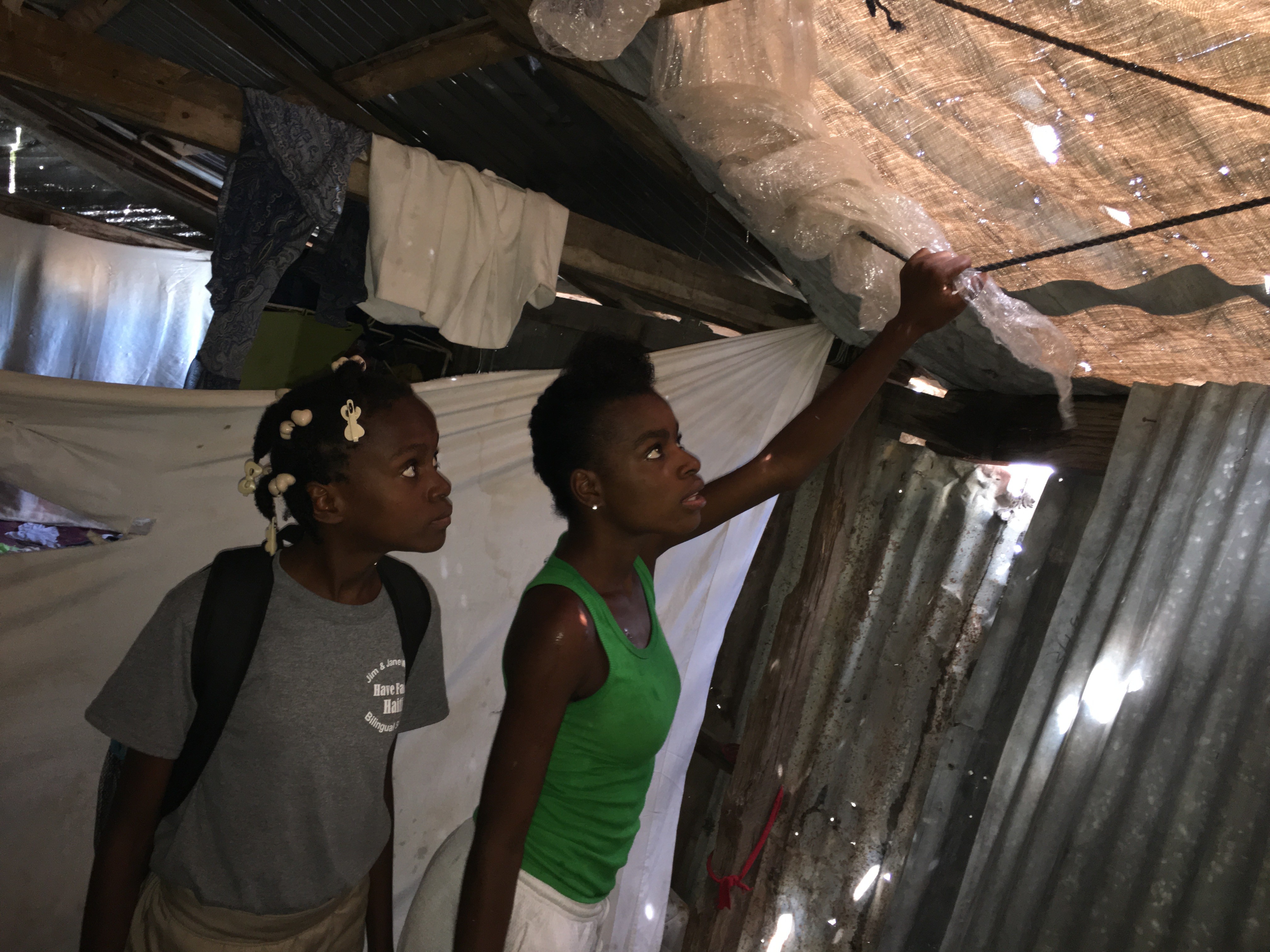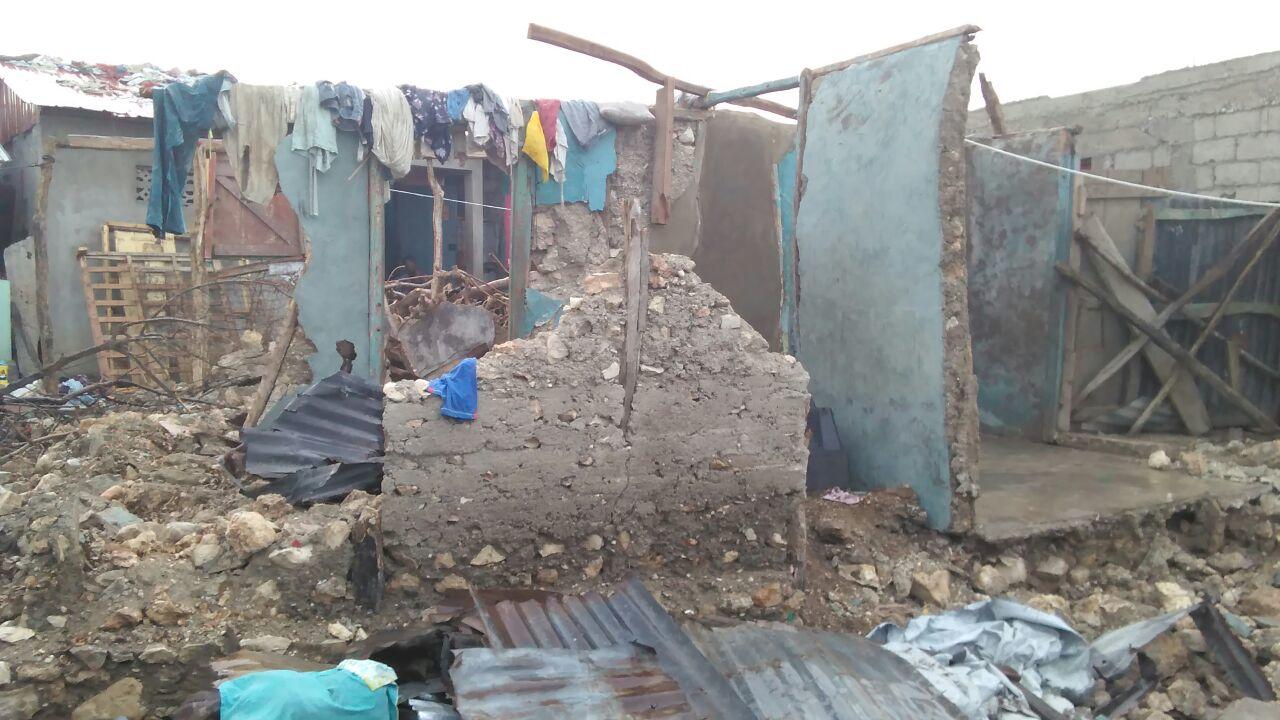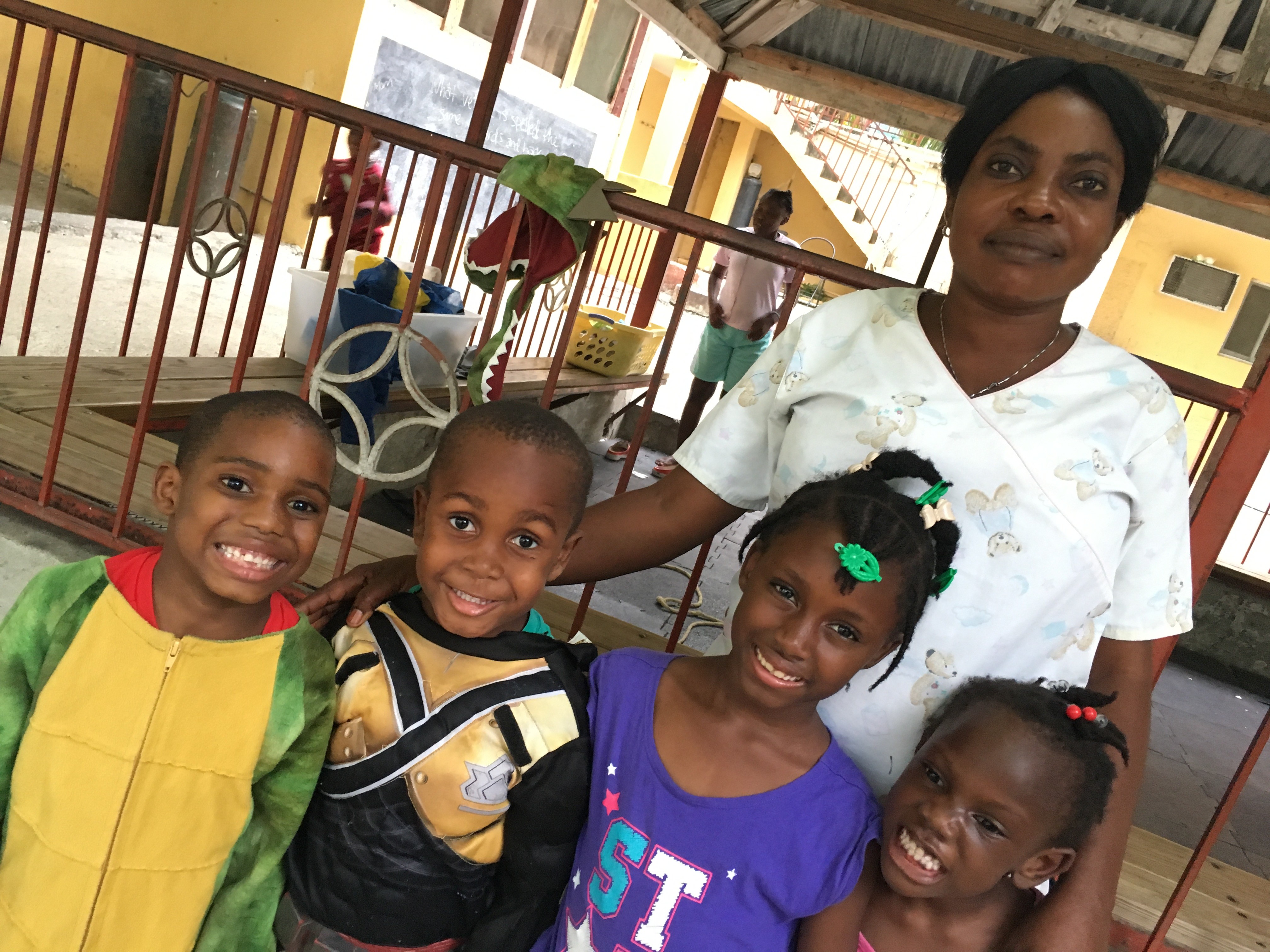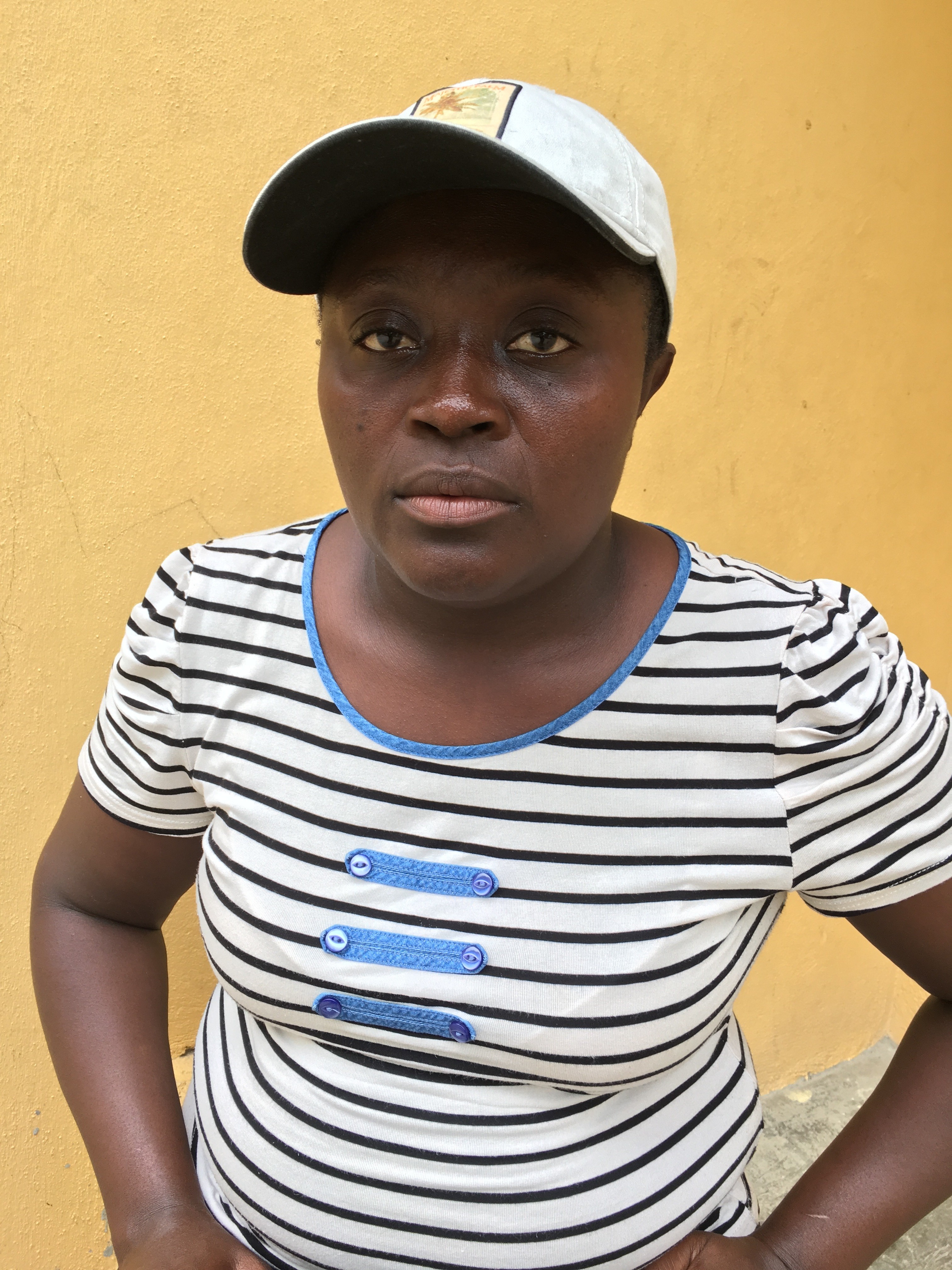
Esterline Nelus, 12 (left) and her sister Stephanie, 16, examine the burlap covering where a tin roof used to be in their tent city village in Port Au Prince. The roof flew away during Hurricane Matthew, flooding their tent and destroying their meager possessions. Esterline is one of 39 children being raised at Have Faith Haiti.
PORT-AU-PRINCE, HAITI – They cowered inside the tent, the rain pounding like a million drumsticks, the wind a dragon’s howl. And then, suddenly, the night sky was stark above them.
“The roof just blew away,” says a 16 year-old girl, pointing where it used to be, “and then…”
She makes a downward motion.
“Water everywhere.”
Her name is Stephanie Nelus. She and her family live in a tent city still here from the last natural disaster to hit Haiti, the 2010 earthquake, which shook the island from below.
This time a devil from above, Hurricane Matthew, washed out a huge chunk of this troubled nation, leaving roofless homes, cropless fields, and waterless communities, with thousands starving, growing ill, and wondering when help will come.
When I landed here last week, it was eerily similar to landing in 2010. FEMA workers on the plane, military personnel at the airport, UN trucks, relief efforts everywhere. Back then, Port Au Prince, Haiti’s largest city with nearly a million people, was the epicenter of death and destruction, while the less populated outer island was, by comparison, mildly shaken.
This time, the capital city held up, while the outer island took the blow – particularly the southwestern portion of Haiti, which absorbed Hurricane Matthew the way roadkill absorbs tires.
A direct hit.
Times so tough
I operate an orphanage/mission here, and ever since the hurricane hit Haiti on October 4th, I’ve received an endless stream of notes and emails, asking about our children. I can now report that our 39 young ones are safe and unhurt; but our extended family – the parents, siblings and relatives of our kids and staff – are in dire need. Our nannies, teachers, handymen and security people wear long expressions and shake their heads, many unable to know the full horror of what’s happened to their loved ones, who are just beginning to get in touch.

Destroyed homes and structure in Jeremie, a coastal city in Haiti devastated by Hurricane Matthew. Hundreds there are reported dead and cholera is on the rise.
“We started running up the hill after our roof blew away,” a man tells me over the phone from Jeremie, a coastal city devastated by the storm. His name is Louimane. He is the younger brother of our mission’s director, Alain Charles, who listens with a stunned expression. Alain grew up in Jeremie. His entire family – brothers, sister, mother – still lives there. For days, he had no idea if they were dead or alive.
“People were running with their babies, getting hit with things that were flying – piece of roofs and walls,” Louimane now tells us. “The water was to our knees. We left everything behind. We only wanted to get up the hill so we would not drown.”
It was only two days later, wandering from place to place, that Louimane discovered his (and Alain’s) mother alive. It was also the first time he ate anything – some cookies and juice. He wore the same clothes for five days.
Today, he sleeps with dozens of others on the floor of a school. “There is no food, no money, no way to build,” he says.
What about clean water?
“We do not have clean water. We drink whatever we can find.”
Meanwhile, just outside of Jeremie is where our nanny, Michou Toussaint, lived until she came to Port Au Prince three years ago, seeking work. She left behind a family of struggling farmers.
Now, she says, “the house I lived in is flattened. The roof blew so far away, no one can find it. All the crops we used to grow – bananas, beans, corn – it is all gone. The cows, goats, lambs, are gone or dead.”

Michou Tousaint, 28, a nanny at the Have Faith Haiti Mission, with some of the children there. She says her entire farming family outside of Jeremie lost their homes and crops and is now sleeping outside, including a 2 month old baby wrapped in coconut leaves.
It was days before she heard from her family, including her sister, Maga, who has a two month-old baby girl. Maga told Michou the family ran from the house before it collapsed. They covered the baby and sloshed through the drumming rain, with no idea where they would go.
“They sleep on the ground now,” Michou says.
And the two month-old baby?
“She sleeps under coconut leaves.”
Welcome to Haiti.
A nation hurting
How do you respond when the world turns upside down? All last week, our children at the Have Faith Haiti Mission were making colorful bracelets, taking hours to braid each one, in hopes of selling them for a few dollars to give to hurricane victims. It’s a value we teach here, taking care of those less fortunate, but it comes naturally to the kids old enough to remember the earthquake six years ago. They recall bags of rice and beans being delivered to our door, and uniformed strangers unloading medicine and clothing. They remember a crew of Detroiters, plumbers, electricians, roofers, hammering and sawing until the place stood tall again.
They know that when one part suffers, another part provides.
Now it is their turn.
Meanwhile, I have wrestled with the proper response during my visit here. The father of one of our children, a 10 year-old girl, has been missing since the storm. No one in his village has seen him. Is he still alive? Do we say anything? How long is hope a realistic approach? All around, the people who care for and love our children now hear their own loved ones’ voices, distant haunting pleas from the rubble of mass destruction.
A few hours from Jeremie is the coastal commune of Pestel, with about 36,000 people. Crops in this region are nearly 100 percent destroyed. A hundred percent? Yes. Cholera is already an issue, with water supplies contaminated and a lack of access to medicine.
Pestel is also where our laundress, a smiling woman named Bonita St. Louis, grew up, as did our handyman, Michel Obeste, a strong serious type who just asked for three days off to go find his family.
“We had goats, horses, a donkey – they all ran away in the storm,” says Michel, 49. “Trees fell on the animals, my cousin was killed, my aunt broke her leg.”
It was six days before he could reach anyone. Can you imagine waiting six days to learn if your family was alive? In your own country?
“I finally reached my older brother,” Michel says. “I say to him, ‘What happened?’
What did he say?
“Everything is gone. “
Against long odds

Bonita St. Louis, 40, a laundress at Have Faith Haiti Mission. Her extended family lost all their homes and possession in Pestel. They are sleeping on a church floor. “I was worried they were all dead,” she says.
The most stunning photos of Hurricane Matthew’s destruction are the aerial shots of Jeremie before and after the storm. Before it looks like a pizza with everything on it – green, yellow, red, orange – and after it just looks brown. The color gone. The homes gone. The life gone.
It is the kind of here yesterday/gone today existence that citizens grow used to in Haiti, the poorest country in the western hemisphere. When half your children never attend school, when more than half your adults live on two U.S. dollars a day, when 59 of every 1,000 infants never see their first birthday, every new problem begets a cluster more.
So the areas devastated by the hurricane can’t be easily reached because the single roads or bridges washed out. And because they can’t be reached, basic supplies like water purification tablets can’t be distributed. And because they can’t be distributed, the water gets contaminated and people drink it and cholera breaks out and the cholera spreads. And because cholera spreads, people are sick and fearful and rebuilding is near impossible. And because rebuilding is crippled, and the region is where a huge chunk of Haiti’s agriculture comes from, food will be scarce, and prices will rise to gouging levels. And at gouging levels, poor people can’t afford anything and so violence breaks out as they try desperately to survive.
And all the while, numbers will rise. The death toll will rise – it is already estimated at over 1,000 by Reuters, but with 700 or 800 missing, who can tell who is dead or yet uncounted? The homeless will rise. The emigration to Port-au-Prince will likely rise, as people with no options and no food come in search of survival.
And, as is always the case here, people will rise. They will come to help – or to try. Aid groups will flock in. Missionaries, church groups, relief agencies, medical teams. Haiti weeps often, and the world comes to dry its tears. But never enough.
And increasingly, it seems, less. The United Nations made a funding appeal for $120 million to help Haiti after Hurricane Matthew. As of a few days ago, only $6 million had been collected. Outsiders are weary of this country. They are distrustful. They have reason to be. The corruption in government is vast and historic. Much of the money in aid for the earthquake –billions were collected – never got to where it was intended.
Need to Help?
All prayers, thoughts, and support for Have Faith Haiti are needed, welcome, and received with our deepest thanks.
Donations may be made out to “Have Faith Haiti” and mailed to A Hole in the Roof Foundation at 29836 Telegraph Road
Southfield, MI 48034 or made online now by selecting GIVE below.
But if nations won’t help, small groups will. People like 62 year-old Gladys Thompson, who we’ve befriended here. She runs a hospital as part of The Foundation For the Children of Haiti. We take our kids there. Gladys spent last weekend and this weekend in the hillsides by Miragoane, where homes were washed away in minutes and people “are now living in rooms made out of hay. It’s inhumane.”
So she’ll bring what medicine and food she can get in her car, and with a group in from Germany, they will do what they can, if not for thousands, then for hundreds. If not for hundreds, then for dozens. Other groups, too numerous to list, will follow.
And we will do the same.
Right now, we are organizing a trip for all our people who have families in the southeast. We will get a large vehicle (bus or equivalent) and load it with the critical supplies, give the time off and let sisters visit sisters, brothers visit brothers, sons and daughters visit parents and grandparents and begin to heal the wounds.
And on our grounds, we will do what I believe we are meant to do here:
We will take in children.
Up to four beds will be cleared for young ones left without family or means by this latest disaster. We will bring them in, feed them, house them, nurture them, love them, give them their own beds, new friends, places to play and make music and art, teach them in a proud and accomplished school, six days a week, and raise them up to be loving, caring, educated adults.
So that hopefully when the next disaster hits – and in Haiti it is always when, never if – they will understand what was done for them and will do the same for their fellow Haitians.
I have often said no one can save this country, but you can save a tiny piece. And if someone else saves a tiny piece, and someone else, it multiplies like raindrops in a hurricane. If you would like to help us, or for us to direct funds to other serious and worthwhile organizations, you can do so at www.havefaithhaiti.org, or by mail through A Hole In the Roof Foundation, 29836 Telegraph Road, Southfield, MI, 48034. One hundred percent of the funds will go directly to aid, no administrative fees or any other charges exist.
We end where we began, in the tin tent just minutes from our mission, where Stephanie and her younger sister Esterline, 12, who is one of the children we take care of, look up at the burlap that now serves as a roof. This is home, this barely-a-shack room, with no water, no electricity, no real furniture, just a couple of mattresses. Yet on one drab and faded mattress I see something colorful: white, pink and lime green.
A schoolbook.
I could not imagine losing everything in an hour. I could not imagine having no water to drink, no food to eat, or my child sleeping in a coconut leaf.
I don’t have to imagine it. It’s right in front of me. And when things like this are right in front of you, what choice do you have but to act?





Well when it is right in front of you there is nothing else to do but help. It has to be terrible for the staff that don’t know about their family or if they have indeed lost them. It must be tough. The kids look so happy and they are given the best place to live without a doubt. It is nice of them to want to help the others by making bracelets. I will donate soon. Probably in a couple of days. We are all so fortunate we live where we do. You always do such a good job.